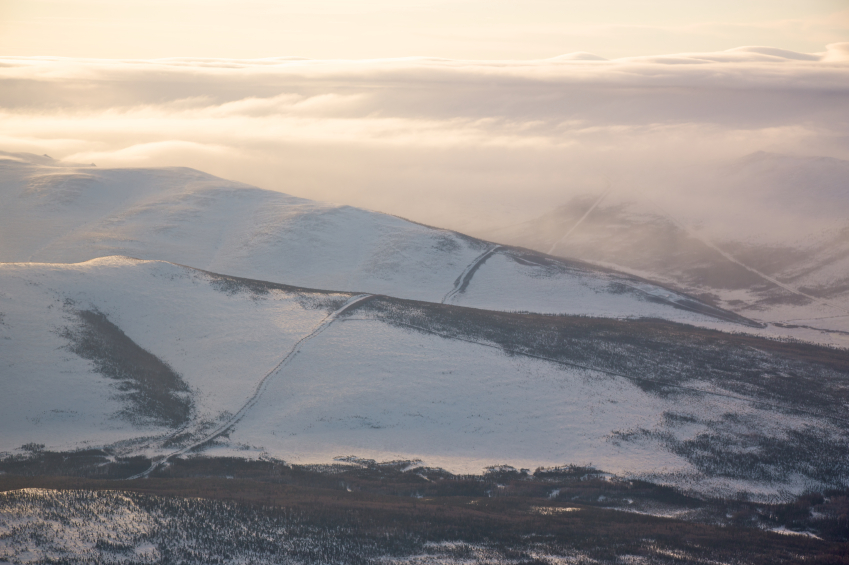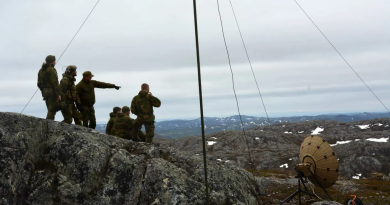Blog: Arctic oil and gas must stay in ground to restrict warming to 2°C says study

Scientists have realized for some time now that the extraction of fossil fuels must dramatically slow down if the global temperature rise is to be kept under 2°C.
A new study in the science journal Nature, however, is the first to specify and quantify which regions of the world need to cool it on the oil, gas, and coal. Christophe McGlade and Paul Elkins of the University of College London’s Institute for Sustainable Resources created a complex model that, after dividing the world into sixteen regions, considers factors such as the cost of production, the estimated size of reserves and production trends, and the carbon dioxide emissions associated with the combustion of oil, gas, hard coal, and lignite.
In order to limit climate change, by 2050, the sheikhs of Saudi Arabia would have to dial down the drills, keeping 38% of oil reserves in the ground regardless of whether carbon capture storage technology is used or not. Prime Minister Stephen Harper would have to call up the oil majors in Alberta and alert them that three-quarters of the country’s oil – most of which is locked up in the Athabasca tar sands – will have to stay put. In the Arctic, 100% of oil and gas reserves must remain undeveloped. McGlade and Elkins assert:
“We estimate there to be 100 billion barrels of oil (including natural gas liquids) and 35 trillion cubic metres of gas in fields within the Arctic Circle that are not being produced as of 2010. However, none is produced in any region in either of the 2°C scenarios before 2050. These results indicate to us that all Arctic resources should be classified as unburnable.“
Perhaps ExxonMobil, forced out of its joint project with Rosneft in Russia’s Kara Sea by U.S. sanctions on dealing with Russian energy companies, actually made a head start in the right direction when it got out in October. Russia, however – arguably the Arctic country most dependent on developing Arctic oil and gas especially as production declines in the older fields of west Siberia – will not be happy with McGlade and Elkins’ findings. But then again, Russians might not worry too much about continuing to drill and thereby bringing about a temperature rise greater than 2°C. A December 2009 Gallup poll found that only 36% of Russians considered global warming to be a serious personal threat. Somewhat surprisingly, the North Americans topped the chart. It might be interesting to see whether there is any correlation between policy decisions on Arctic oil and gas made by the governments of the eight Arctic Council states and perceptions of climate change at the individual level within each country.
If national governments in the Arctic heeded the researchers’ recommendation to the oil and gas in the ground, one also has to wonder whether there would be as much of a frenzy amongst the Arctic coastal states over claiming as vast continental shelves as possible. There are other motives at work aside from natural resources such as a desire to own the North Pole, but the possibility of owning the rights to the seabed are also significant.
What future for Arctic oil in a climate and capital-constrained world?
In their strongest statement, at the end of the paper, the UCL scientists effectively conclude that we need to forget peak oil. There’s actually too much for us to burn without dramatically raising global temperatures. Instead, we need to think about peak production and realize that it must be behind us. McGlade and Elkins argue:
“These results demonstrate that a stark transformation in our understanding of fossil fuel availability is necessary. Although there have previously been fears over the scarcity of fossil fuels, in a climate-constrained world this is no longer a relevant concern.”
So if we are to believe the authors of the Nature study, preserving the stability of the global climate means not drilling in the Arctic for the welfare of society and the environment. But if that isn’t convincing enough, the logistics and economics are against it, too. It’s not just a climate-constrained world, but an infrastructure- and capital-constrained, one, too.
In just the span of six and a half years, the world has gone from excitement over a potential black gold rush in the Arctic sparked in part by the 2008 publication of the United States Geological Survey’s Circum-Polar Arctic Resource Appraisal (which estimated 90 billion barrels of oil, 1,669 trillion cubic feet of natural gas, and 44 billion barrels of natural gas, of which 84% lies offshore) to scientists warning that all these vast reserves must stay in the ground. Epitomizing the hubris of drilling for oil in the Arctic, the cover story of the New York Times Sunday Magazine on December presented a gripping account of the blunders, cut corners, and bad luck that led to the wreck of the Kulluk, Shell’s mobile drill ship that had participated in the ultimately doomed forays to explore for oil and gas in the Chukchi and Beaufort Seas north of Alaska. Some might call Shell unlucky in having to deal with sea ice that lasted longer than anticipated, thus shortening the operating season, thirty-foot swells, and stormy weather. But that’s the Alaskan Arctic – and there, bad luck is often a result of bad preparation. If we can never prepare enough to safely drill in the Arctic, then perhaps we shouldn’t drill at all. From a pure logistics standpoint, the sheer difficulty of operations in the region mean that it’s safer – and saner – to refrain from drilling in the Arctic.
Investments in oil, gas, and coal may be risky for additional reasons. Talk of a “carbon bubble” has led leaders such as the Canadian-born governor of the Bank of England, Mark Carney, to warn in a letter to the UK Parliament’s Environmental Audit Committee that “vast majority of reserves are unburnable.” One of the riskiest spots of all for potential investors could be the Arctic, particularly if 100% of reserves end up being left locked under the melting ice and turn into what Carney and others have termed “stranded carbon.” ConocoPhillips and Statoil have decided not to drill in the region for now, while Total has also spoken out against Arctic drilling (despite hypocritically purchasing Arctic oil). Chevron cancelled its plans in the Canadian Arctic last month, citing “economic uncertainty in the industry.” In March, Shell will decide whether or not it will go ahead with its plans, years in the making and billions in the hole, to drill offshore Alaska.
From the perspective of current supply and demand, too, the numbers are against drilling. The price of WTI oil hovers a hair about $50 a barrel, but the break-even price for many Arctic projects starts at $90 a barrel. The price of oil will rise again, and with it, there will inevitably be calls by oil majors announcing that they are ready and prepared to take on the Arctic. Shell will announce, “Let’s Go!” as it did with this ad it put out a few years ago, complete with a toy polar bear, that Greenpeace later mocked.
The pipe dream of a global consensus against Arctic oil
Some might say that we in the West cannot decide how development will proceed in other parts of the world. For instance, the argument is sometimes made that we cannot deny the billions of people in China and India the right to burn energy and emit carbon in the same manner that many Western countries did earlier this century. Likewise, in the Arctic, some might say that we cannot prohibit indigenous peoples from developing non-renewable resources on their land if they are in favor of it. And indeed, we cannot. But the deeper question to ask is why governments in places like Greenland are issuing licenses for oil and gas development in the first place. In short, this active encouragement of a deeply risky activity is due to the extension of international markets and the global race for natural resources into the earth’s most distant reaches.
This extension has denied indigenous peoples the right and the space to choose alternative economic livelihoods, for the spread of these market forces is worldwide – hence the word “globalization.” For people in places like Nunavut and Greenland, winning increased self-determination, sovereignty, and even perhaps one day full nationhood is a victory and a major step forward from colonialism and paternalism. But it is also a harbinger of something else: the transformation of a people into a settled, orderly, and willing participant in the global market, a system that is fueled by the extraction of non-renewable resources.
It’s hard to turn down the lure of oil and gas once it comes spouting out of the earth. It will ultimately take a regional or even global consensus to leave all the oil and gas in the Arctic in the ground, and that consensus is probably is just a pipe dream. Yet if the day comes where all of the oil majors choose to stay away from the Arctic, a regional consensus will also be needed to ensure that alternative and meaningful economic livelihoods not dependent on the extraction of non-renewable resources can be sustained in the Arctic. Groups such as the Arctic Economic Council, formed last year, should take the helm and begin preparing for truly sustainable economies in the Arctic rather than just taking a green paintbrush to the status quo.
In 2014, the Arctic Council published the “Agreement on Cooperation on Marine Oil Pollution Preparedness and Response in the Arctic.” What the council should really begin working on is an agreement on cooperation on preparedness for and response to a post-oil Arctic.
This post first appeared on Cryopolitics, an Arctic News and Analysis blog
Related stories from around the North:
Canada: Will Russia’s actions in Ukraine affect relations in the Arctic Council?, Eye on the Arctic
Finland: Rouble collapse hits Finland, Forex stops buying Russian currency, Yle News
Iceland: From Arctic Circle 2013-2014, a big drop in the price of oil, Blog by Mia Bennett
Norway: Currency drama has little impact on tourism in Barents region, Barents Observer
Russia: Russian crisis money for Novatek’s Yamal LNG project, Barents Observer
Sweden: Falling oil prices benefit Sweden, Radio Sweden
United States: World oil price decline siphons billions of dollars expected by Alaska, Alaska Dispatch News


